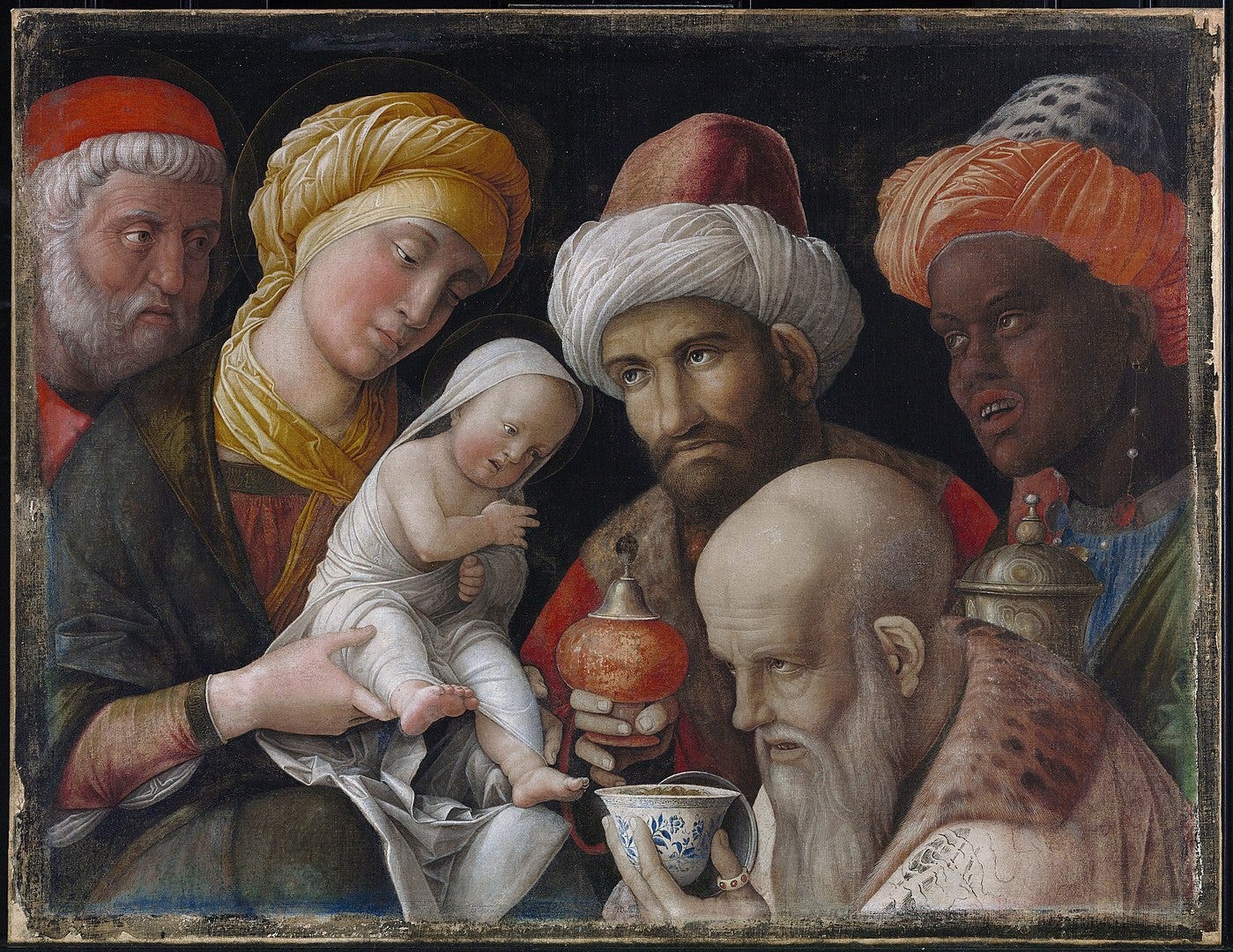The Christmas season has passed, and even we Christians are attempting to slough off the annual but nevertheless post-Christmas despond. Mainly, I mean the practical sweat and work of defrocking and disassembling bedecked trees, wrapping up Nativity set pieces, and putting away the vivid, seasonal decorations that so delight us.
But such labor is life in our imperfect world, and I am thankful that in the liturgical year, Christmas moves seamlessly into Epiphany, a revealing time of light. As I try to neatly put away the happy messes of Christmas, I enjoy the bright, peaceful promise of Epiphany. I long thought that Epiphany was always connected to the Gospel accounts of the wise men visiting the Christ Child, but that’s a more recent connection. And it is fitting, for the point of Epiphany is to show Christ as God to all men, everywhere.
I say men on purpose, for in our time, nearly every masculine referent has been neutered, and this is harmful to all of us. We are people made in the image of God, and God made us male and female purposely and deliberately. He made us creatures to bring forth life, and only a male and female together can do that. We are
As a woman, I absolutely count myself as a part of mankind. I believe in God the Father almighty and His only Son, Jesus Christ, and I have been baptized into Christ. God created me in the flesh, and He marked me as His own and as His child. I am included in mankind because I am His created and redeemed child. That is the only requirement I need to be a part of mankind.
No one who’s paying attention in America in 2023 is surprised by the dearth of Christian manliness in our culture. Many commentators have weighed in on this, but few mention the elephant in the room: the concomitant problem of Christian womanliness. Carmel Richardson points out in “A Battle of the Sexes” that
The problem is not a mere lack of masculine energy. There is a reason even those who hope to exercise masculine virtue, those who wish they worked with their hands, want to eat real meat, and hope to find a good wife, still hang around in chat rooms. The public square has cast them out for the very virtues that make them masculine. It will not accept them until women either praise men for their masculinity or step out of the way.
Public acceptance of praiseworthy masculinity is not the carrot that drives good men to be men. The public square, as a metonym for public approval, merely reflects the prevailing cultural consensus toward masculinity. And women, despite their immense cultural power, are not the final arbiters of acceptable masculinity. Being real, true men is the reward in and of itself.
But Richardson is correct that men do need women, neither as haranguing manipulators or fellow competitors. They need subordinates, as Pastor David Petersen so eloquently explained, primarily in marriage, but in other realms, too—women who work alongside men in sympathy and with common cause.
So what’s a Christian woman like me to do?
First, I thank God He gave me a husband who is the head of our household, spiritually first and in other ways, too. Jon finds fulfillment working with his hands, whether they’re bloody in processing elk meat, or chapped and rough with cold from a DIY house-exterior plumbing job, or greasy from a dryer fix, or soiled with the excrements of a stubborn, potty-trained-regressing two-year-old. This is not easy work, and it often calls little attention to itself. I must pay attention to it and give thanks when I see it, or I am likely to take it for granted and forget it happened.
Second, I can encourage my husband and other men, including our five sons as men-in-training, to continue to grow in skills and in wisdom alike. Wise men know they are not wise but must learn, or they must turn to others who can lead them. Watching YouTube videos on butchering or soldering is, in a small way, asking questions for which men need answers. This is good practice for the more significant theological searching in which all men must engage.
And this leads me to the third, which is that I gladly attend worship services where men stand in the stead and by the command of Christ to share His good news with us. Tonight, we heard in Matthew how the wise men came to Jerusalem asking a question: “Where is he who has been born king of the Jews? For we saw his star in the east and have come to worship him” (2:2). From this one question, the scheming Herod interrogates Jewish leaders about ancient prophecies and examines the wise men for the time when the star rose, then—inexplicably to me, at least—hangs back at the moment when it would make more sense for him to go with the Magi. If he was so interested in this promised king, why did he not go find him himself? But here is where Herod’s motives are clear. He is not seeking the Christ in faith, the way the wise men are. He is politically calculating and exclusively worldly focused. In short, Herod is a man who is not masculine. If he was, he would be a man turning in humility and repentance to the God who made him, and one reacting with joy at finding the Savior.
Pastors point to the wise men as the radical seekers whom God used to bring the knowledge of Jesus to the Gentiles. But even the wise men as individuals aren’t important. The Bible never mentions their names, or exactly where they came from, or even how many of them there were. But they show us how men should be, pointing to the one Man who saves us all, whose light shines on us eternally.
Happy Epiphany.




